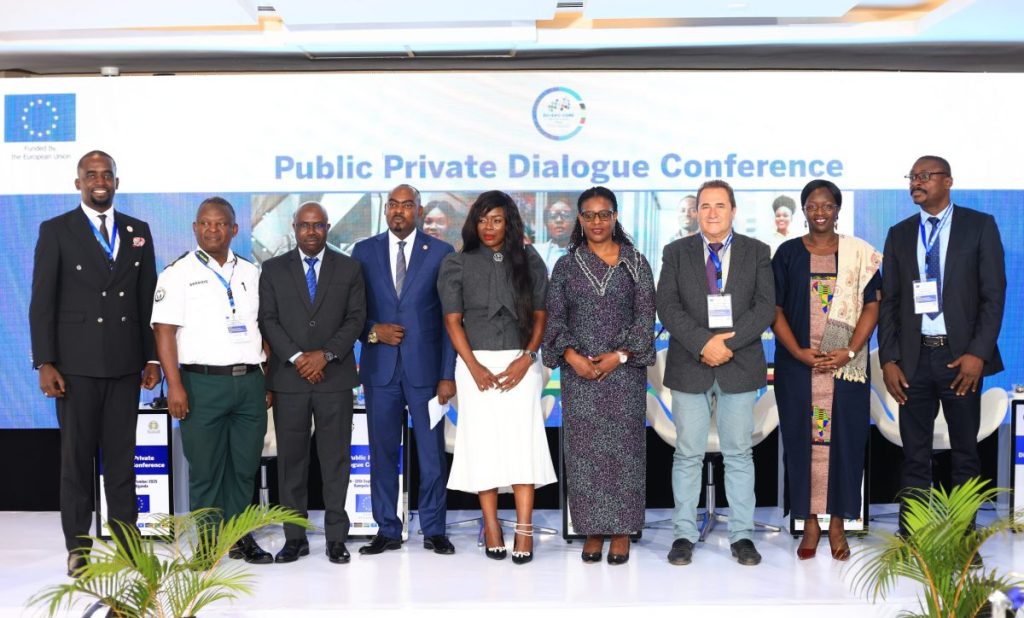The East African Community (EAC) Secretariat, in partnership with the EU- EAC CORE Programme, has held the inaugural Public-Private Dialogue (PPD) on Mobility of Business Persons, which will took place from September 11 to 12, 2025, in Kampala, Uganda.
This landmark event convened Public and Private Sector Representatives, specifically immigration authorities and representatives of the Ministry of Internal Affairs, Ministries of Trade, Labour organizations, Service sector regulators, and representatives from service sector Business entities across all EAC Partner States. The dialogue aimed to create a dynamic platform for public and private sector stakeholders to collaboratively address longstanding barriers to cross-border mobility and develop actionable solutions that drive regional integration and economic growth.
A Region on the Move: Overcoming Barriers Together
The EAC Common Market Protocol, a cornerstone of regional integration, guarantees the free movement of persons, labour, services, and capital. While intra-EAC trade in services has grown by 12% over the past five years, the number of professionals able to move and work across borders remains below 30,000 annually—less than 0.01% of the region’s skilled workforce.
Despite Mutual Recognition Agreements (MRAs) in engineering, accountancy, and architecture, implementation remains uneven. Only 40% of eligible professionals successfully utilize these MRAs to work in another Partner State.
Key Challenges for Governments
Advancing Mode IV movement (temporary movement of service suppliers) requires governments to address several critical challenges:
Immigration and Security: Balancing openness with national security requires robust systems for identity verification, data sharing, and background checks.
Labour Market Protection: Safeguarding local employment while avoiding excessive restrictions that could stifle growth and innovation.
Recognition of Qualifications: Addressing gaps in the mutual recognition of professional and academic qualifications to prevent underemployment and skills mismatch.
Administrative and Regulatory Complexity: Streamlining processes, integrating digital solutions, and establishing single-window systems to reduce delays and inconsistencies.
Limited Awareness and Communication: Enhancing outreach, user-friendly information portals, and capacity-building initiatives to ensure professionals and businesses are aware of their rights and opportunities.
The Way Forward
With the invaluable support of partners—including the European Union Delegation through the EU-EAC CORE Programme—the EAC Secretariat is committed to working closely with Partner States to overcome these challenges. This Public–Private Dialogue will provide a unique opportunity for business leaders, government officials, and regulators to share experiences and co-create practical solutions for business mobility.
Participants will also explore international best practices, drawing lessons from successful models such as the European Union’s “Points of Single Contact” (PSC) system and the APEC Business Travel Card (ABTC). The goal is to design a tailored solution that addresses the specific needs of the EAC’s liberalized service sectors, including education, finance, communications, business services, and transport—sectors vital for job creation, economic growth and societal well-being.
A Strong Partnership: The EU-EAC CORE Programme
The EU-EAC CORE Programme stands as a testament to the power of international cooperation in advancing regional integration. By providing technical and financial support from the European Union Delegation, the Programme is instrumental in strengthening the EAC’s capacity to implement the Common Market Protocol and foster a more competitive, innovative, and inclusive economy. The EU-EAC CORE Programme’s unwavering commitment to removing barriers and promoting the free movement of services and professionals is helping to unlock new opportunities for businesses and citizens across the EAC. This partnership exemplifies how shared values and strategic collaboration can drive sustainable development, prosperity, and unity across borders.
“Seamless movement of business persons is not just a policy aspiration; it is a catalyst for innovation, job creation, and shared prosperity across East Africa,” said Ms Annette Ssemuwemba, Deputy Secretary General of the East African Community. “This dialogue marks a pivotal step towards breaking down barriers and unlocking the full potential of our region’s service sectors. We are especially grateful for the support of the EU-EAC CORE Programme, whose partnership is vital to realizing these ambitions. We invite all stakeholders to join us in shaping a more integrated and prosperous EAC.”
The EAC Secretariat invites all Partner States stakeholders, business leaders, and development partners to actively participate in this pioneering dialogue. Together, we can build seamless borders and shared prosperity for the entire East African region.
The East African Community (EAC) is a regional intergovernmental organization of eight Partner States: the Democratic Republic of the Congo, the Republic of Burundi, the Republic of Kenya, the Republic of Rwanda, the Federal Republic of Somalia, the Republic of South Sudan, the Republic of Uganda, and the United Republic of Tanzania. The EAC is dedicated to deepening cooperation among Partner States across political, economic, and social spheres for the mutual benefit of all.


